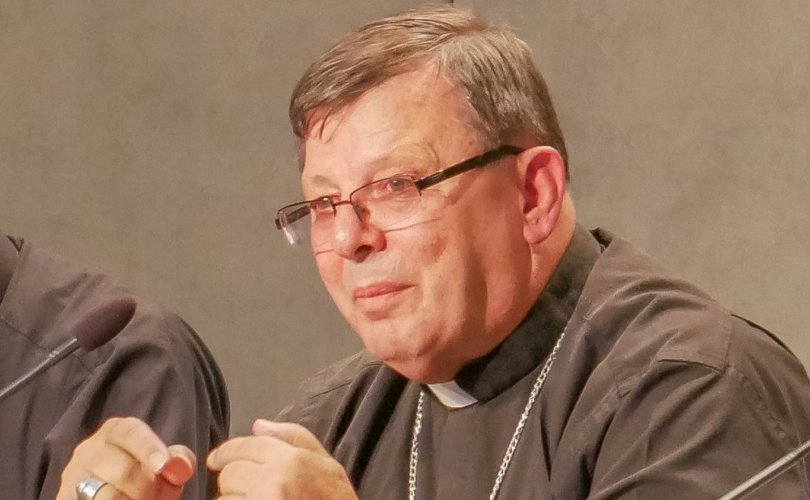VATICAN CITY, October 10, 2019 (LifeSiteNews) ― A Brazilian missionary bishop has condemned abortion in the global North.
“Some hospitals have become true slaughterhouses,” said Bishop Wilmar Santin, O.Carm.
The bishop of Itaituba in Pará, Brazil, was responding to a question at a press conference following today’s meetings at the Synod for the Bishops of the Pan-Amazonian Region when he made the remark.
A reporter from Il Messagero, an Italian newspaper, asked the Carmelite bishop if it is true that infanticide happens among indigenous peoples in the Amazonian region. Santin gave a candid overview of the historical, now extinct, violent practices of the tribe he knows best, the Mundurukus.
“The Munduruku people were warriors, a very war-mongering people,” he said.
“They are the people known for severing their enemies’ heads and carrying them as trophies. And they had the habit of, if a child had a defect at the time of birth, snapping their necks so the child would die,” he continued.
Santin added that if the mother gave birth to twins, they would kill the second one, believing that the child was evil, and sometimes kill them both to be sure. The children of unmarried women would also be killed at birth, for one Munduruku saying was, “A child without a father is a child without worth.”
“Upon hearing this, we are frightened,” said Santin. “[We ask,] ‘How can they commit such an atrocity?’”
“But how about the abortions performed here within civilization?” he continued.
“How many are performed? After all, how many children in the world are [allowed to be] born with defects?”
“I reaffirm: it is very easy to bewildered by [Amazonian infanticide] while looking away from some hospitals that have become true slaughterhouses.”
Santin said missionary sisters working in the Amazon have been bringing an end to the infanticide. He revealed also that he had seen a disabled child and a couple of twins among the Munduruku.
“So it seems that, at least among the Munduruku people, this practice is recently extinct,” he said. “But I reaffirm: it is very easy to be bewildered by that while looking away from some hospitals that have become true slaughterhouses.”
Brazil is a strongly pro-life country compared to others. Abortion is currently legal in Brazil in cases of rape, when there is a risk to the mother's health, or when the baby's brain is seriously deformed.
Bishop Medardo de Jesús Henao del Río of the Xaverian Missionaries of Yarumal also responded to the question. This bishop is both apostolic vicar of Mitú and bishop of the Diocese of Case Mediane in Colombia. He described how another indigenous tribe used to abandon disabled babies and rejected twins for ants or animals to eat. Fortunately, early 20th-century Catholic missionaries were able to convince them to stop the cruel practice.
“With accompaniment on the part of the Church, which has always been close, boarding schools … were opened to students, for children to go somewhere to receive an education and health care,” the bishop said.
“The priests in a systematic fashion went to each community, and when they encountered these phenomena, they would educate people with science and show them that it was not a demon or a spirit that had taken shape inside the woman and had harmed the child or had been born as the second child, which they killed,” he continued. “So that situation was abandoned.”
Henao del Río said he believes that it is the “state” that commits infanticide, citing little girls, one with epilepsy and another with a tumor, who died before they could get medical attention, even though the bishop and his group had approached all the agencies meant to protect children.
“So, I think it is the absence of the state that causes these deaths, this infanticide, out of lack of concern and because of corruption.”
The grisly topic of infanticide was first raised at a synod press conference on Monday, when Swiss journalist Giuseppe Rusconi criticized the notion that indigenous people have a “primitive purity” and should be taken as models and teachers for coexistance with the environment.
“However, still today around twenty Amazonian peoples practice infanticide,” he stated. “And on a website of the Brazilian episcopal conference there appears a contribution in which this practice is justified. So I am asking if for you human rights have a universal application, or if they are valid for some and not for others.”
Cardinal Pedro Ricardo Barreto Jimeno, S.J., archbishop of Huancayo, said the journalist’s claim surprised him.
However, Victoria Lucia Tauli-Corpuz, the Filipina U.N. special rapporteur on the rights of indigenous peoples, did not deny the infanticide charge. Instead, she acknowledged that aboriginal people have customs and traditions that are not consistent with human rights.
“Indigenous people are not perfect,” Tauli-Corpuz said, “and indeed they have practices which are not coherent with human rights standards.”

